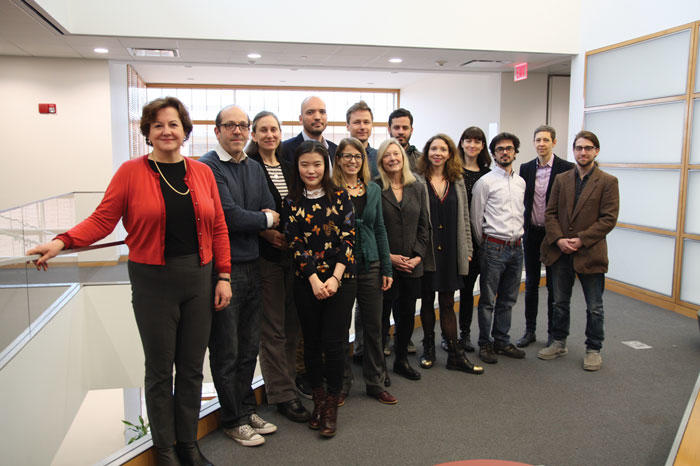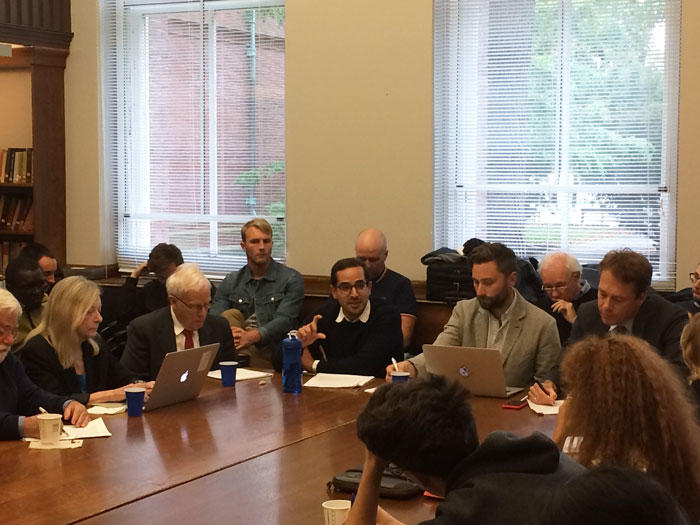Born out of a need to complement the Center’s traditional focus of supporting individual faculty and student research, our new Weatherhead Research Clusters center around hefty questions for the social sciences and the world.
The Weatherhead Research Cluster on Comparative Inequality and Inclusion

Advanced industrial societies have become increasingly characterized by two trends: growing inequality and an increasing recognition gap. As the distribution of wealth and income has grown more unequal, an increasing number of groups are making claims for recognition as the poor, workers, immigrants, Muslims, LGBTQ people, and various ethnoracial and religious minority groups experience stigmatization. A major challenge for contemporary societies is to extend cultural membership to the greatest number. Thus we need to gain a better understanding of the social and cultural processes behind the recognition gap and inequality. How can social scientists and policy makers better understand and respond to these trends, and how can we make societies more inclusive? Finding responses to the timely questions related to inequality and the recognition gap requires drawing on expertise from many disciplines.
During the fall semester, our research cluster brought together a diverse group of visitors working on recognition. Our first event of the semester, held on September 13, was an organizational meeting during which scholars from different fields brainstormed the ways they could collaborate and learn from their respective research projects. This event also included a presentation by SCANCOR visiting scholar Antoinette Hetzler on the recognition of teachers and the transformation of work in a changing welfare state in Sweden.
The following two meetings in October marked the beginning of our lunch seminars—during which participants like Canada Program postdoctoral fellow Mireille Paquet and University of Toronto Professor Ron Levi shared their research on the making of the immigration policy in Canada and the claims for recognition in the field of international justice, respectively.
On November 13, Marie Skłodowska-Curie Fellow Lorenza Fontana presented her recent work on political identity, recognition claims, and social conflict in Bolivia, Peru, and Columbia. University of Edinburgh postdoctoral scholar Andreas Hackl also presented his work on the stigmatization and discrimination experienced by Arab Palestinian citizens of Israel.
December brings a few more seminars to the research cluster. On December 7, visiting scholar Camille Hamidi will present her work on ethnic minority representatives in French politics. Her presentation will be followed by that of Pontificia Universidad Católica de Chile graduate student Matias López, who works on perceptions of the poor and attitudes toward redistribution among the elite in Brazil and South Africa.
We also look forward to having a half-day seminar on “Analytical Tools for the Study of Recognition across the Disciplines,” with Professor Stefan Hirschauer, on December 8. Professor Hirschauer directs SOCUM, an innovative multidisciplinary research program on social and cultural differentiation at the University of Mains.
In the spring semester, the research cluster will ramp up its activities by reaching out to WCFIA Faculty Associates studying various dimensions of recognition. The broader objective will be to better connect faculty, visitors, and graduate students through research around common interests. The regular meetings, workshops, and the more informal social gatherings will continue to be important venues for further discussion.
For information or to receive updates on the activities in this research cluster, please visit the Weatherhead Research Cluster on Comparative Inequality and Inclusion website or contact our graduate student cluster coordinator Bo Yun Park.
The Weatherhead Research Cluster on Global Populism

The world’s economic-political order appears to be at an inflection point, with its future direction hanging in balance. The Weatherhead Research Cluster on Global Populism responds to the upending of everyday assumptions of the conventional strengthening of global governance. Ever-changing current events—such as the Brexit vote, the Trump presidency, and the rise of populist-nationalist parties in Netherlands, France, Germany, and elsewhere in Europe—make the topic immediate. The Harvard community has greeted us with enthusiasm and interest since getting the program off the ground in late summer.
Our first event on September 18 with University of Oxford Professor Timothy Garton Ash, was very well attended, and showed a real enthusiasm for asking difficult questions about global populism. Ash’s talk was titled “Does European Populism Exist?” and explored what, if anything, Europe tells us about populism—and what populism tells us about Europe.
A panel on “The Economic and Cultural Causes of Populist Support” on October 19 featured a strong lineup of MIT Professor David Autor, Einaudi Institute for Economics and Finance Professor Luigi Guiso, and Faculty Associate Peter A. Hall. Faculty Associates Bart Bonikowski and Jennifer Hochschild from our steering group served as discussants. This rich discussion among the panelists covered a variety of topics, focusing on distrust in government—and whether that increases or decreases voter turnout.
We also partnered with the Study Group on Populism, Nationalism and Radical Politics at the Center for European Studies on November 15 for a panel titled “Euroskepticism in a Post-Brexit Era,” featuring University of Essex Professor Catherine de Vries, University of Kent Professor Matthew Goodwin, Georgetown University Professor Kathleen McNamara, and University of Amsterdam Professor Armen Hakhverdian. The panel examined the uncertainty around whether the Brexit vote—and Euroskepticism trends more generally—represents continued commitment to the European project, a vote against populism, or confusion over the future of the EU.
The spring term will mark the beginning of our lunch seminars, with regular meetings for our steering group and graduate student affiliates to discuss current issues on global populism. These meetings will bring together the many scholars at Harvard who are trying to make sense of recent developments from diverse disciplinary perspectives, as well as encourage graduate student research. We also look forward to hosting a book talk for Yascha Mounk on The Age of Responsibility: Luck, Choice, and the Welfare State, and a presentation by Faculty Associates Steve Levitsky and Daniel Ziblatt on their new book How Democracies Die at the Weatherhead Forum.
We feel very fortunate that so many people here at Harvard share our desire to understand where populism is coming from and where it is taking us. We will continue to foster a sustained intellectual exchange across disciplines and established research traditions.
For information or to receive updates on the activities in this research cluster, please visit the Weatherhead Research Cluster on Global Populism website or contact our cluster coordinator Jessica Barnard.
The Weatherhead Research Cluster on Global Transformations

The Weatherhead Initiative on Global History (WIGH) has been designated as one of three new research clusters: the Weatherhead Research Cluster on Global Transformations. Since the shift, our group of co-chairs has grown with the addition of two Faculty Associates: Jean Comaroff and Sugata Bose. Both bring interdisciplinary approaches to the study of vast areas of the world that are central to many conversations on global history. Our own disciplinary mission remains the same: to study and explain the global currents of change that societies and economies have undergone through their continuing interaction—whether through investment and commerce, migration, empires and colonization, or ideas and cultural transfer.
This fall, we held two large international conferences. On September 5–6, we met in Athens, Greece, for “Reinforcing, Crossing, and Transcending Borders: Soccer in a Globalized World,” a continuation of our global history of soccer project under the leadership of Simmons College Professor Stephen Ortega and Faculty Associate Cemal Kafadar. The conference generated significant publicity in Greece—not least because the keynote speaker was Senator George Mitchell—and successfully began a conversation on soccer’s role and responsibilities between academics, activists, and former players.
On December 3–5, our network partners in Delhi hosted “Empires: Towards a Global History.” Empires—which have had an enduring influence on global history—have drawn their strength from a global systemic architecture of hegemony and dominance. The conference sought to delineate different strands and interconnected themes that explain both empires’ persistence as well as their mutations over time. Representatives from all our network partners in Senegal, China, Brazil, the Netherlands, the USA, and India all attended, as well as other international scholars.
The well-established Global History Seminar drew many interested participants for its fall term meetings. Our own fellows presented the first three papers: Quinn Slobodian on “The Road to the Alt Right: How Race and Culture Split the Neoliberal Movement”; Justin Jackson on “The Everyday Politics of Imperial Sovereignty: The U.S. Army and the Making of American Colonialisms in Cuba and the Philippines”; and Christy Thornton on “A Mexican International Economic Order? Tracing the Hidden Roots of the Charter of Economic Rights and Duties of States.” We were also pleased to host Rutgers Professor Julia Stephens, speaking on “Governing Islam: Law and Ritual in Imperial Contexts.”
WIGH also sponsored a talk by University of Texas at Austin Professor Jeremi Suri on “The Rise and Fall of the American Presidency in Historical Perspective,” chaired by Faculty Associate Arne Westad. Suri’s talk, drawn from his new book The Impossible Presidency: The Rise and Fall of America’s Highest Office, made the provocative argument that the American presidency has grown simultaneously more powerful yet less effective than ever before.
The Weatherhead Research Cluster on Global Transformations will continue to play an important role in establishing a vibrant and rapidly growing community of global history scholars here at Harvard, and in building connections with partner organizations on all continents.
For information or to receive updates on the activities in this research cluster, please visit the Weatherhead Research Cluster on Global Transformations website or contact our cluster coordinator Jessica Barnard.
Captions
1. Participants in the Weatherhead Research Cluster on Comparative Inequality and Inclusion, led by Center Director Michèle Lamont (left). Credit: Kristin Caulfield
2. Weatherhead Research Cluster on Global Populism lecture titled "Does European Populism Exist?" Credit: Kristin Caulfield
3. Weatherhead Research Cluster on Global Transformations seminar titled “The Road to the Alt Right: How Race and Culture Split the Neoliberal Movement.” Credit: Kristin Caulfield
